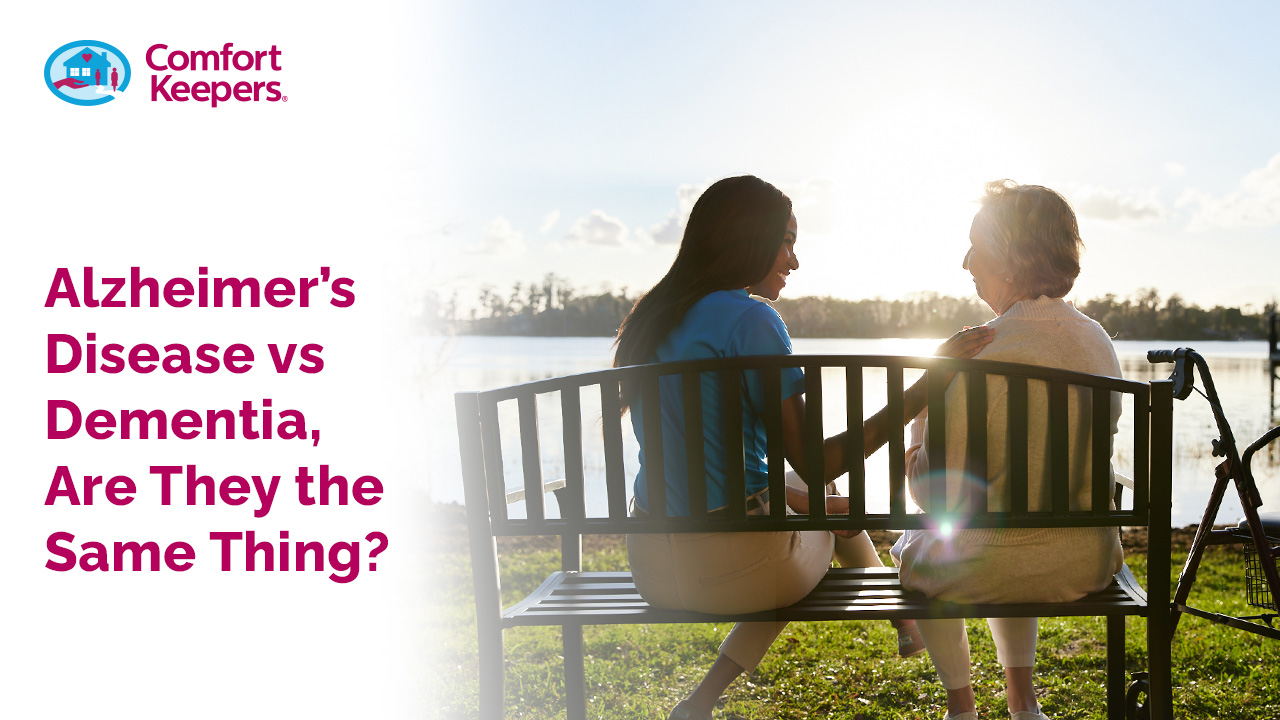
When it comes to palliative care or home health care in relation to loved ones suffering from Alzheimer's or dementia, our team at Comfort Keepers Citrus Heights is here to help you better understand the difference between the two, the signs to be aware of, and the long-term care for both. In this blog, we explore the difference between Alzheimer’s disease and dementia, and reveal whether or not they are the same thing so that those offering in-home care services and palliative care can offer the right support for patients suffering from either.
Are they the Same Thing? No, they’re Not
Learning about the two terms and the difference between them, and that they are actually not the same thing, is important and can empower individuals living with Alzheimer’s disease or dementia, their families and their caregivers who offer palliative care, respite care and in-home care services with necessary knowledge and understanding.
Agespace explains the above well, “Dementia and Alzheimer’s are not the same thing. Dementia is a general term for a decline in cognitive abilities that include memory loss and thinking difficulties. Alzheimer’s is a disease that affects the brain and causes dementia. Alzheimer’s is only one of many types of dementia — each with its own cause.”
Dementia Overview: A General Term
Dementia is a general term to describe a collection of symptoms with no specific cause—a general term for a group of similar diseases with each boasting a set of symptoms.
The Alzheimer’s Association describes this in more depth, “Disorders grouped under the general term “dementia” are caused by abnormal brain changes. These changes trigger a decline in thinking skills, also known as cognitive abilities, severe enough to impair daily life and independent function. They also affect behavior, feelings and relationships.”
Dementia causes damage to the cells of the brain within a distinct region of the brain. This damage then interferes with that region’s brain cells’ ability to communicate with one another and other regions of the brain, which then negatively affects behavior and feelings and sees the decline of brain function with different symptoms emerging.
Alzheimer’s Disease Overview: A Specific Disease
Alzheimer’s disease is a specific type of dementia. While dementia sees brain cells being damaged, Alzheimer’s disease sees cells’ proteins inside and outside of the brain becoming damaged.
More specifically, while dementia affects different regions of the brain, Alzheimer’s disease mainly refers to the hippocampus region of the brain—that which deals with memory and memory loss. Different from dementia, the brain cells in this region become damaged first when suffering from Alzheimer’s.
According to the Center For Disease Control (CDC), “This is the most common cause of dementia, accounting for 60 to 80 percent of cases. It is caused by specific changes in the brain. The trademark symptom is trouble remembering recent events, such as a conversation that occurred minutes or hours ago, while difficulty remembering more distant memories occurs later in the disease. Other concerns like difficulty with walking or talking or personality changes also come later.”
What’s the Outlook for People with Dementia vs People with Alzheimer’s?
This question has no specific answer, despite what most online medical sites and public opinion may suggest. Diseases present different outlooks depending on the individual and the stage of the disease. Therefore, to answer this question in confined terms or limit the answer to a fit-for-all list of outlooks would not be recommended, with a suggestion to rather understand that outlooks can be good or bad, and different for each individual.
However, it must be noted that while there is no cure for dementia, it isn’t necessarily a death sentence, and retaining a positive mental state and outlook is imperative to the maintenance of both Dementia and Alzheimer, as well as the taking of medical aids and undergoing palliative care, respite care and proper home care.
How to Care for Alzheimer’s Disease and Dementia
To provide sufficient care, caregivers, medical experts, loved ones, and in-home care services should base their caring routine and medical treatment options according to the needs of the individual in question.
Adding to the importance of treating every individual case in a unique way, Agespace suggests, ‘Some symptoms and treatments for dementia caused by Alzheimer’s are not the same as the symptoms and treatments available for other types of dementia.” The CDC concurs, “Treatment of dementia depends on the underlying cause.”
However, in general, “Treatment of dementia depends on its cause. In the case of most progressive dementias, including Alzheimer's disease, there is no cure, but one treatment—aducanumab—is the first therapy to demonstrate that removing amyloid, one of the hallmarks of Alzheimer’s disease, from the brain is reasonably likely to reduce the cognitive and functional decline in people living with early Alzheimer’s.”
The association continues, “The same medications used to treat Alzheimer's are among the drugs sometimes prescribed to help with symptoms of other types of dementias. Non-drug therapies can also alleviate some symptoms of dementia.”
Apart from medical treatment, continuing one’s research and education for both dementia and Alzheimer’s is a good option. For this, it’s important for families and loved ones to use home health care in Citrus Heights, CA, and care homes like Comfort Keepers to help their loved ones, as well as make use of their online resources and educational offerings.
Apart from keeping up with one’s knowledge and learning about both dementia and Alzheimer’s disease, one needs to encourage those suffering from these to eat healthily, stop smoking, regularly exercise, keep social contact with loved ones, and always seek medical advice from doctors and specialists, and keep up visits with those at Comfort Keepers Citrus Heights. Alternatively, log into your personal page here.









